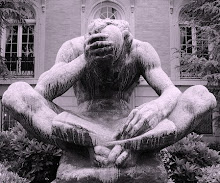
The Road Warrior (aka Mad Max 2) doesn't get old, I've just begun to realize. I find it interesting that it doesn't because the clothes and hair are so painfully dated and not much happens plot-wise: it's just a loner getting a truck for to good guys to get out of their city with.
But that loner is the one who interests me. Mel Gibson does a nice job of playing a guy who's been alone for a long time (he lost his family and partner in the previous film) and doesn't want to be around anyone else. What's painfully obvious for the viewer is that Max's chosen road is a death sentence: sooner or later, the petrol runs out or he gets himself in a tight spot that even Dog can help him get out of. He's obviously on a treadmill, and the best he can do is maintain. But he's got to be alone--even when he finds a decent partner (the Gyro-copter Captain) and a good sidekick (the feral kid).
In the end, the one I feel sorry for is actually Max because he's left behind--even more alone (he's without Dog now) and more broken down than he was before. He bears his hero status with that poker face, but it's the hero status that keeps him from being a part of the community. The Gyro-copter Captain becomes the leader of that band, and later on the feral kid learns how to talk and leads the band. Max can't do that even though he's more inspirational to those people than any of their other leaders.
I sometimes think this is so because he's not of them, but it's kind of a chicken-or-the-egg situation: he's a hero not a leader because he's not of them? or he's not of them because he's a hero not a leader? The second choice has more to recommend it since the Gyro-copter Captain is not of the community, either. That would seem to suggest that in order to be a hero, the character would have to be separated from the community that he or she is working to protect. Hero's never represent communities--not through synecdoche, metonymy, exemplae, or isotyping. It's usually the leader, the king.
In the medieval and Renaissance periods, you get the "king's body" in the Body Politic metaphor; the nation and land is figured/personified into the symbolic body of the king and the king is reified (to use Paxson's apparently unorthodox definition of the word) into the nation and the land (see the Fisher King for an example). Hero's don't get this, and if they do get something, it tends to be outside of the realm (I'm thinking of the Pillars of Hercules, which mark the outer boundaries of the Mediterranean).
So while the community goes on "2000 miles north" to an Edenic land where "all you have to do is breathe," Max stays behind. Is it any wonder that they're in the Outback? He's out there, the only place he can really be a hero (because if he goes with the community and becomes a leader, he ceases to be a hero), the only place to meet the monsters...
which makes you wonder: just how much of a hero and how much of a monster is Max?

No comments:
Post a Comment